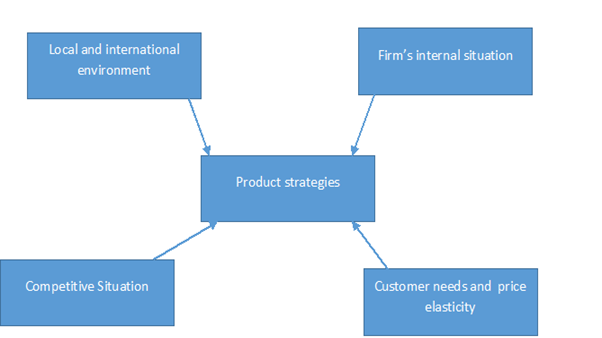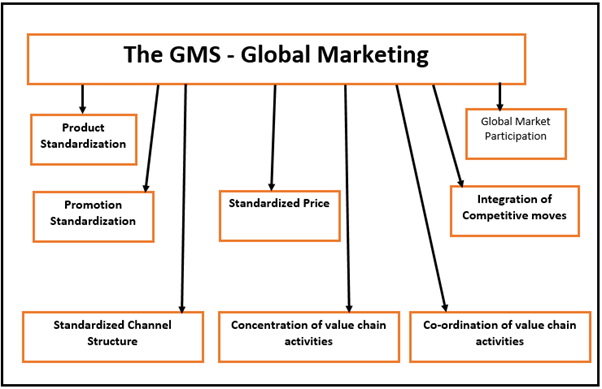Global Marketing Strategies
It has been emphasized in numerous management studies that companies cannot be confined to domestic market in the age of globalization. Firms must devise global marketing strategies to gain competitive advantage and escalate profit. Global marketing enables marketing managers to look for emergent target markets and product opportunities in abroad. Global marketing occurs when marketing executives use a global plan to successfully market their goods and services at global level.
Several management scholars affirmed that global marketing strategy is one of the constituent of a global strategy. In order to be successful, it must integrate all functional aspects of a business from finance to operations to R&D. It must also have a well-defined objective. Global marketing strategy are categorized into many types (Jean-Pierre Jeannet, 2005).
Global segment strategy: A company that decide to target same element in different nation peruse Global segment strategy.
Global marketing mix element strategy: These strategies incorporate globalization along individual marketing mix elements such as pricing, distribution, product or communication. They are partly globalized strategies that permit firms that customize other aspects of its marketing strategy. Although various types of strategies may apply, the most important are global product strategies, global advertising strategies and global branding strategies.
Global product strategy: Global product category strategy implies that company will consider targeting different segments and varying the product, advertising, branding according to local market requirements. Pursuing a global product strategy suggests that a company has principally globalized its product offering. Although the product may not need to be completely standardized universally, major aspects may in fact be globalized. Global product strategies require that product use conditions, expected features and required product functions be largely identical so that few variations or changes are needed. Global strategies will yield more capacity, which will make the original investment easier to justify.

Global branding strategy: These strategies consist of using same brand name or logo around the globe. Global branding strategy are recommended where the target customers travel across the cross border and are exposed to products elsewhere.
Global advertising strategy: These are also associated with using same brand worldwide. Global advertising themes are beneficial when a firm wants to market to consumer around the world.
Hybrid global marketing strategy: Sometimes, companies adopt several generic strategies simultaneously. Accompany might follow global brand strategy for one part of business while at the same time using local brands in other part of its business. When company use composite global marketing strategy, one generic strategy dominates and other generic strategies tend to be lower priority (Jean-Pierre Jeannet, 2005).
Major Global Marketing Strategy Dimensions:
1. Standardization:
Economies of scale Economies of scale � low cost low cost
Consistent brand image
2. Concentration and Coordination Concentration and Coordination of Value of Value-Chain Activities:
Benefits from different nation�s comparative advantages
Economies of scale
Cross-country synergies country synergies
3. Integration:
Cross-subsidization: drawing resources from one subsidization: drawing resources from one country to compete in another.
Cross-pollination: borrowing good ideas from one pollination: borrowing good ideas from one country and applying them to another
Conceptualization of global marketing strategies

Global marketing strategies brings managers to develop a global mindset as the first step. The mind-set is the viewpoint or frame of mind that the marketer carries at global level. The global mind-set is characterized by a different view of the opportunities and the facts of the world market. It is more encompassing than the domestic, international, multinational, or even panregional perspective. It is a new, truly different aspect in managerial thinking that transcends conventional labels and shapes the outlook of global marketers. The marketing manager who develops a global mind-set will need knowledge about the world markets encompassing key market knowledge, economic knowledge, political knowledge, cultural knowledge, historic knowledge, geographic knowledge. Marketing managers who want to plot strategy with a global mind-set will be challenged to process the massive amount of data they obtain in different ways.
Global marketing strategy has many advantages if these are implemented effectively:
1. Improved product and service effectiveness
2. Stronger competitive advantage.
3. Heightened customer awareness: With the Internet, customers can track the progress or lack thereof of a product all over the world.
4. Cost reduction and savings: By focusing on new markets, markets can achieve economies of scale and scope through standardization in some areas.
There are many advantages of global marketing such as experience, scale, resource utilization and sales and profit growth.
To summarize, Global marketing strategy must be pursues to gain competitive advantages. It has been documented in literature that Global marketing strategy requires a new way of thinking about global marketing operations (Jean-Pierre Jeannet, 2005). There are many types of global marketing strategies which marketers develop to success in world market.